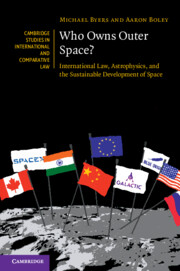Figures
1.1A comparison between suborbital and orbital flight trajectories
2.1Image of a star cluster with multiple satellite streaks passing through the field of view
2.3Top: inclinations of active and defunct satellites as a function of orbital altitude; bottom: spatial density of objects in orbit as a function of altitude
2.4Spatial density of objects in orbit as a function of altitude, including possible densities of several proposed satellite constellations
4.1Apogee–perigee distribution of abandoned rocket bodies in orbit
4.2Image streak due to a tumbling abandoned rocket body in orbit
4.3Photograph of a piece of rocket that survived re-entry and landed on Earth’s surface
4.4Casualty expectations based on abandoned rocket bodies in orbit, along with a breakdown of contributions by launching states or regions
4.5Curves for two rocket body weighting functions, representing the fraction of time spent over each latitude
4.6Population density curve and a total rocket body weighting function projected onto a world map
5.3Orbital diagram showing Mercury, Venus, Earth, Mars and Bennu
5.4Photograph of NASA Administrator Jim Bridenstine, President Donald Trump, VP Mike Pence and Second Lady Karen Pence watching a rocket launch
6.1Photograph of Lake Manicouagan, which was created by a five-kilometre-diameter asteroid
6.3Near-Earth asteroid discovery curves, cumulative with time
6.4Visualisation of the minimum orbital intersection distance (MOID) between a Bennu-like asteroid orbit and Earth
6.5B-plane figure showing simulation results of different deflection scenarios for the hypothetical impactor 2019 PDC
6.6Comet 67P/Churyumov–Gerasimenko, in a mosaic of four photographs from ESA’s Rosetta spacecraft
6.7The expected damage due to an airburst from a 60-metre asteroid
7.1Gabbard plot showing the apogee–perigee distribution of tracked fragments resulting from India’s ASAT weapon test
7.2Fraction of USA 193 and Microsat-R debris de-orbited by the number of months after the events
7.3Orbital trajectories for 340 pieces of debris from the Russian ASAT weapon test
7.4The increase in tracked debris across different altitudes due to the Russian ASAT weapon test
7.5Ballistic trajectories for three different profiles, showing a depressed, an efficient and a high-altitude trajectory
7.6Simplified example of ballistic missile flight times corresponding to depressed, efficient and high-altitude trajectories
7.8Surviving debris resulting from the catastrophic break-up of a missile during an FTG-15-like ICBM interception test
7.9A depiction of the Lagrange points for a simple dynamical model involving two massive bodies
8.1Density of debris in orbit as of 27 January 2022 due to ASAT weapon tests
8.2Photograph of Indian ballistic missile defence interceptor being launched for ASAT weapon test

